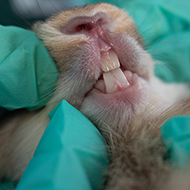
The findings could be used to inform improvements in veterinary training.
A new study has identified the common clinical signs for rabbits experiencing dental disease and evaluated the various veterinary diagnostic and treatment methods.
Researchers at the Royal Veterinary College (RVC) analysed data from a random sample of rabbits (2,219) with dental disease attending UK primary care practices during 2019.
They found the most frequently recorded clinical signs of dental disease were reduced food intake (25.1 per cent), reduced faecal output (10.9 per cent) and ocular discharge (10.6 per cent). Other key findings of the study include:
• visual oral examination contributed to diagnosis in 2,168 rabbits
• across the 754 rabbits that received tooth trimming, there were 244 incisor trimming events and 593 cheek teeth trimming events.
• cheek teeth trimming was performed on conscious (non-sedated or non-anaesthetised) rabbits in 36 cases.
• Dietary modification for improvement of dental disease was recommended for 476 cases.
The team hopes their findings could be used to inform improvements in initial veterinary training and professional development and boost veterinary confidence in diagnosing and treating the disease.
Their suggested improvements include greater use of diagnostic imaging to assess sub-gingival tooth roots, never using nail clippers to trim incisions and reminding owners about the importance of providing hay (or grass) in the diet.
Study lead Maria Jackson, research assistant in rabbit health and welfare and a veterinary nurse, said: “When assessing the clinical records of these 2,219 rabbits with dental disease, I was glad to see that so many owners of affected rabbits were advised to change their rabbit’s diet. Feeding lots of high-fibre hay, grass, and leafy greens is crucial in the prevention, or slowing the progression, of dental disease.
“On the other hand, I was surprised to see so few cases where radiography was used. Most, if not all, veterinary practices have radiography equipment, and it’s an invaluable tool to aid diagnosis of dental disease, planning treatment, and to show owners the extent of their rabbit’s dental disease.”
Study supervisor Dr Charlotte Burn, associate professor at the RVC, added: “We already knew that dental disease can be painful for rabbits and can stop them being able to eat properly, but this research reinforces the importance of good veterinary care for rabbit teeth.
'Many rabbits find it stressful having their cheek teeth examined or trimmed using the recommended methods, but sedation and analgesia can help with this where appropriate. Having a full radiographic diagnosis, followed by tailored treatment and advice, can help improve rabbit quality of life.”
The study, “Dental disease in rabbits under UK primary veterinary care: Clinical management and associated welfare impacts', is published in Vet Record.
Image (C) Shutterstock.



 Zoetis has launched a new survey to identify management techniques for Equine Herpes Virus (EHV).
Zoetis has launched a new survey to identify management techniques for Equine Herpes Virus (EHV).